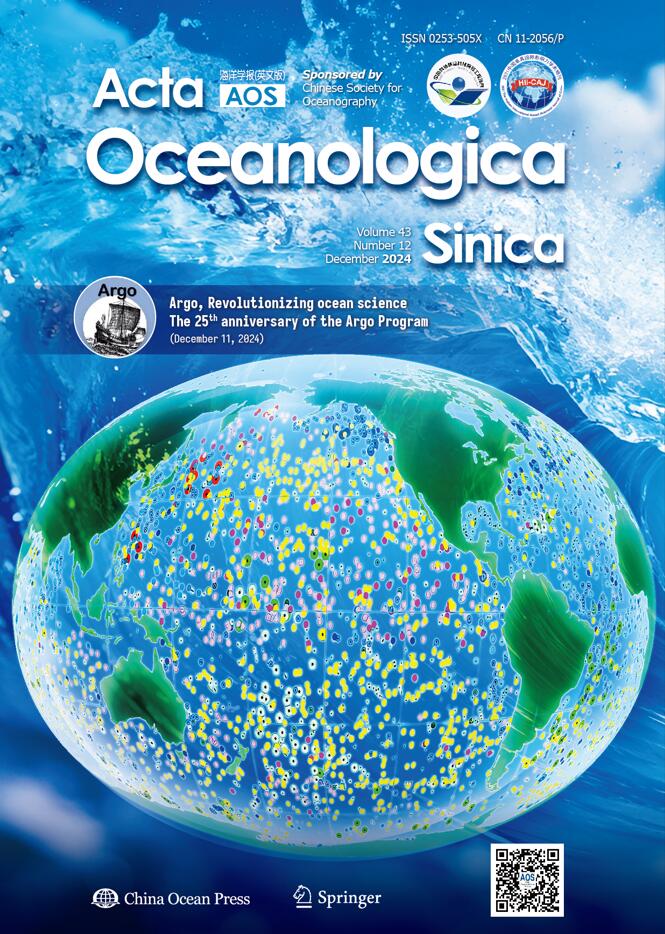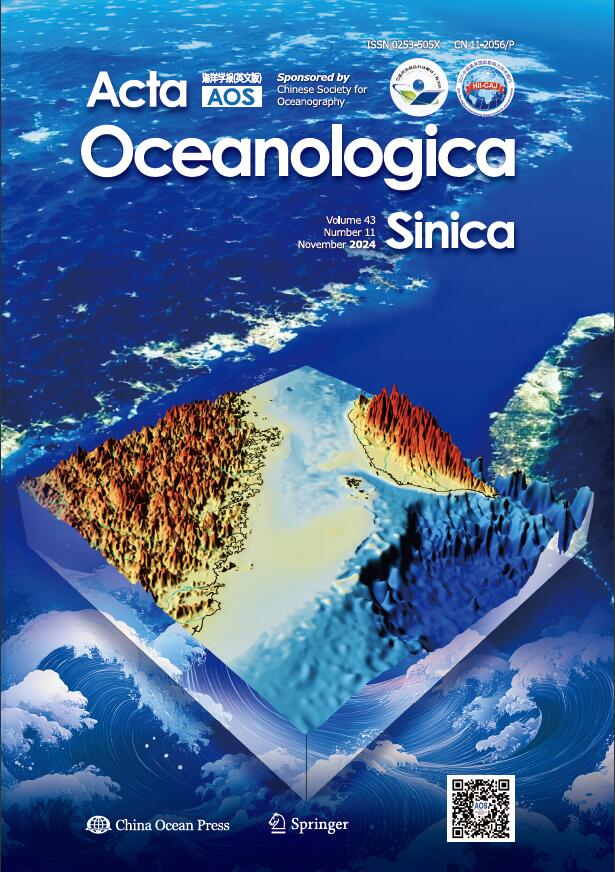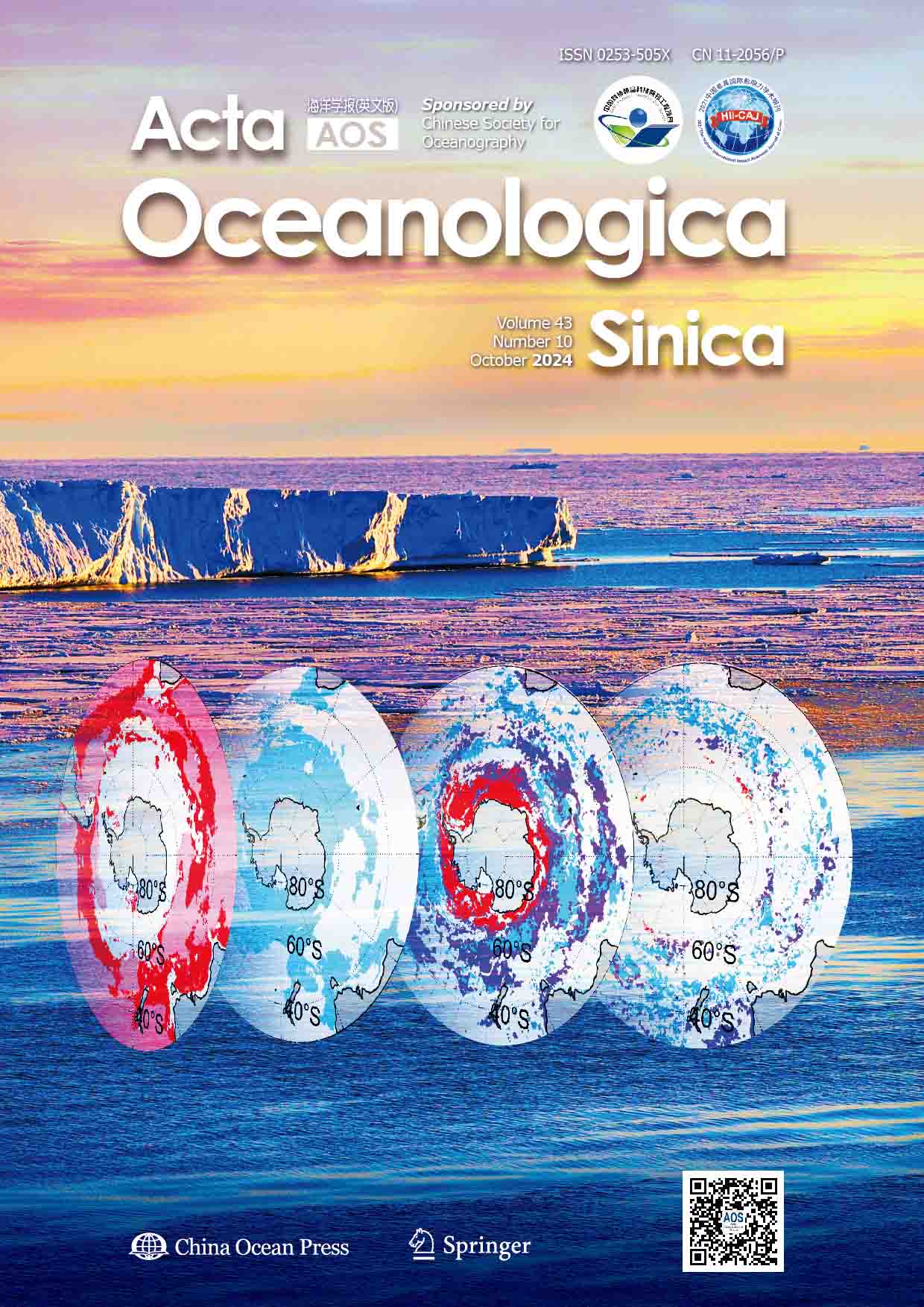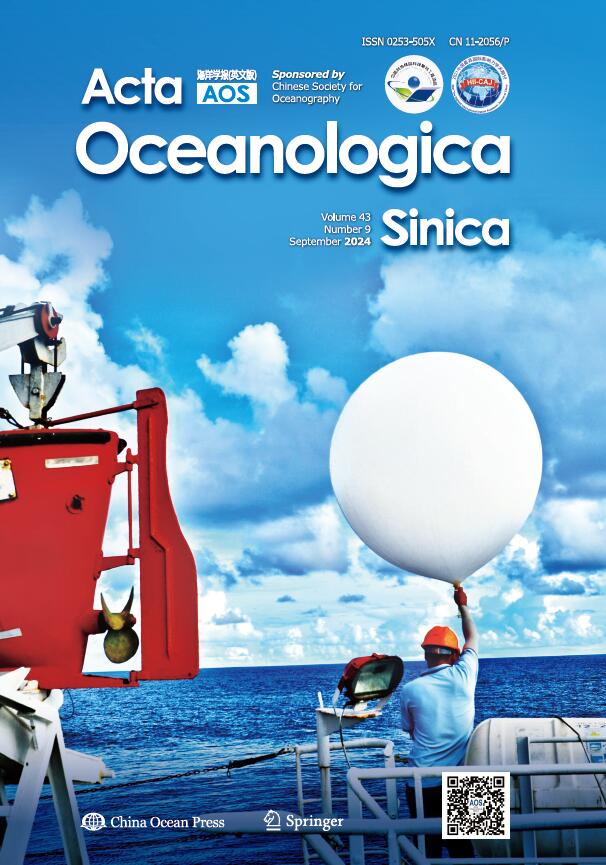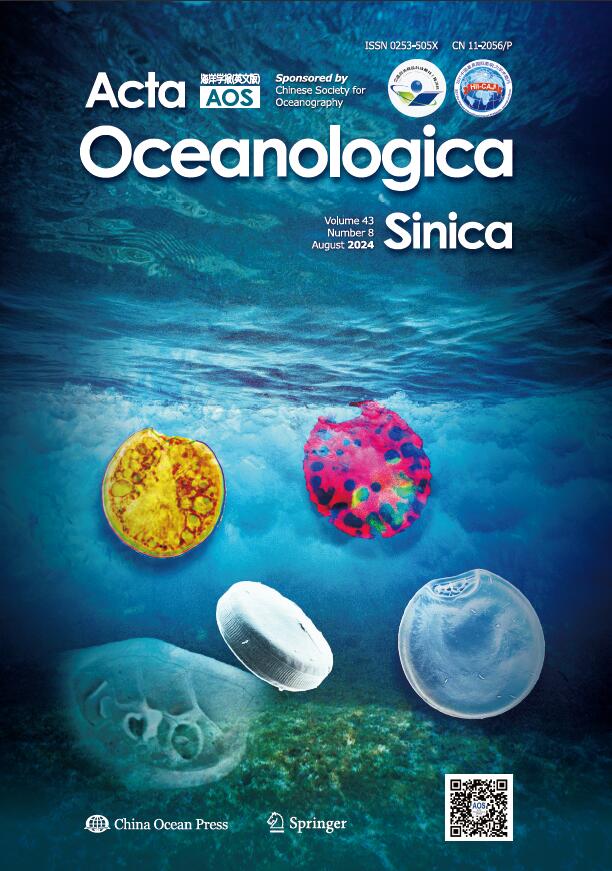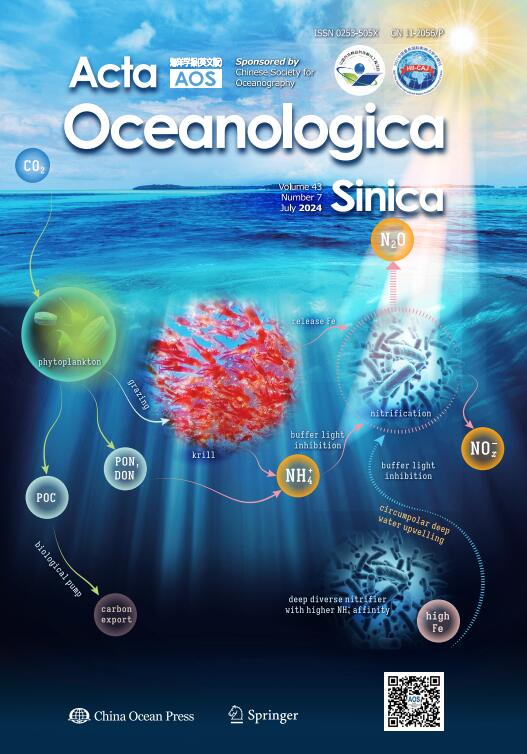1988 Vol. 7, No. 4
Display Method:
1988, (4): 481-489.
Abstract:
In this paper, the low-frequency fluctuations of sea level and their relationship to atmospheric forcing along the coasts of the Huanghai Sea and the East China Sea are studied.Spectrum analyses are made for the time series of daily mean sea level, atmospheric pressure and wind stress at seven coastal stations.It is found that at all the stations, the main part of the energy of the sea level fluctuations, within the (2-60)-day period, is concentrated on the (12-60)-day period band and that an obvious spectral peak appears at the 3-day period.Along the coast of the Huanghai Sea, variations in the sea level are greater in winter than in summer.In winter, along the coasts of the Huanghai Sea and the East China Sea there is a kind of sea level fluctuations propagating southwards.Among the many factors causing sea level variation, the most obvious one is atmospheric pressure, followed next by the alongshore wind stress.
In this paper, the low-frequency fluctuations of sea level and their relationship to atmospheric forcing along the coasts of the Huanghai Sea and the East China Sea are studied.Spectrum analyses are made for the time series of daily mean sea level, atmospheric pressure and wind stress at seven coastal stations.It is found that at all the stations, the main part of the energy of the sea level fluctuations, within the (2-60)-day period, is concentrated on the (12-60)-day period band and that an obvious spectral peak appears at the 3-day period.Along the coast of the Huanghai Sea, variations in the sea level are greater in winter than in summer.In winter, along the coasts of the Huanghai Sea and the East China Sea there is a kind of sea level fluctuations propagating southwards.Among the many factors causing sea level variation, the most obvious one is atmospheric pressure, followed next by the alongshore wind stress.
1988, (4): 490-495.
Abstract:
In this paper, tidal data of 19 years were analysed to obtain the harmonic constants of 472 constituents; yearly variations of the harmonic constants of some constituents for 19 years were also examined.
We have also derived the formulae of response analysis by using another approach, and calculated 161 response weights of astronomical tides, solar radiational tides and nonlinear tides for 10 stations.Some significant results were obtained.
In this paper, tidal data of 19 years were analysed to obtain the harmonic constants of 472 constituents; yearly variations of the harmonic constants of some constituents for 19 years were also examined.
We have also derived the formulae of response analysis by using another approach, and calculated 161 response weights of astronomical tides, solar radiational tides and nonlinear tides for 10 stations.Some significant results were obtained.
1988, (4): 496-501.
Abstract:
In many scientific fields such as meteorology, biology, geography, oceanography and astronomy, the angle value is very important, for example, wind directions, and the directions on which animals and birds migrate.This kind of data is called as directional data.In some problems, it is not expressed as "angle" value, such as month by month mean temperature, however, it can be changed into a directional data through some transformations.The statistical method of directional data means that the methods of mathematical statistics are used in the treatment of directional data.In this way, data are considered as the points on two-dimensional cycle or higher dimensional sphere.Therefore, this method can also be called statistics on sphere.Because of its own characteristical feature, the statistics of directional data much differ from common statistics.Up to now, research work in this field has just started in China.In this paper, a statistical study on typhoon moving directions after their formation over the China Sea and the Western Pacific by use of the directional data method is reviewed.
In many scientific fields such as meteorology, biology, geography, oceanography and astronomy, the angle value is very important, for example, wind directions, and the directions on which animals and birds migrate.This kind of data is called as directional data.In some problems, it is not expressed as "angle" value, such as month by month mean temperature, however, it can be changed into a directional data through some transformations.The statistical method of directional data means that the methods of mathematical statistics are used in the treatment of directional data.In this way, data are considered as the points on two-dimensional cycle or higher dimensional sphere.Therefore, this method can also be called statistics on sphere.Because of its own characteristical feature, the statistics of directional data much differ from common statistics.Up to now, research work in this field has just started in China.In this paper, a statistical study on typhoon moving directions after their formation over the China Sea and the Western Pacific by use of the directional data method is reviewed.
1988, (4): 502-513.
Abstract:
The saturated moist air with temperature T, pressure P and specific humidity q may be considered as an equivalent dry model air with temperature T* and pressure P under the condition of constant enthalpy.The features of the equivalent dry model air are described and the diagnostic analyses for the summer monsoon over Eastern Asia are examined.Results show that there are obvious baroclinicity features of equivalent temperature, i.e., wet baroclinicity, with a strong gradient belt of equivalent temperature for a time scale mean about 30 days in summer monsoon region and it is in accord with the confluence belt of the warmer air and colder air expressed by equivalent temperature; the mean updraft was observed at its warmer part of that region and downdraft at its colder part; the vertical shear of horizontal wind vector between 150 hPa and 850 hPa is related to the mass field expressed by mean equivalent temperature in that layer.
The saturated moist air with temperature T, pressure P and specific humidity q may be considered as an equivalent dry model air with temperature T* and pressure P under the condition of constant enthalpy.The features of the equivalent dry model air are described and the diagnostic analyses for the summer monsoon over Eastern Asia are examined.Results show that there are obvious baroclinicity features of equivalent temperature, i.e., wet baroclinicity, with a strong gradient belt of equivalent temperature for a time scale mean about 30 days in summer monsoon region and it is in accord with the confluence belt of the warmer air and colder air expressed by equivalent temperature; the mean updraft was observed at its warmer part of that region and downdraft at its colder part; the vertical shear of horizontal wind vector between 150 hPa and 850 hPa is related to the mass field expressed by mean equivalent temperature in that layer.
1988, (4): 514-520.
Abstract:
The paper studies the short period response of an unbounded and uniform ocean to moving wind field.Firstly, it is shown that the response disturbance has two kinds of motion, one is geostrophical and other is inertial gravity wave.Secondly, this paper studies the disturbance source caused by a circular wind field which moves rapidly in a straight path on a horizontal plane.It is shown that the disturbance source is mainly determined by the distribution of the curl of wind stress.Thirdly, this paper studies the solution of disturbance equation with nonhomogeous term of disturbance source as an impulse.It is shown that the oceanic response is determined by disturbance source.Finally, by calculating numerically the current velocity and surface elevation in time, it is shown that the intensity, spatial scale and duration of the response are closely related to wind field.
The paper studies the short period response of an unbounded and uniform ocean to moving wind field.Firstly, it is shown that the response disturbance has two kinds of motion, one is geostrophical and other is inertial gravity wave.Secondly, this paper studies the disturbance source caused by a circular wind field which moves rapidly in a straight path on a horizontal plane.It is shown that the disturbance source is mainly determined by the distribution of the curl of wind stress.Thirdly, this paper studies the solution of disturbance equation with nonhomogeous term of disturbance source as an impulse.It is shown that the oceanic response is determined by disturbance source.Finally, by calculating numerically the current velocity and surface elevation in time, it is shown that the intensity, spatial scale and duration of the response are closely related to wind field.
1988, (4): 521-532.
Abstract:
Using the Comprehensive Ocean-Atmosphere Data Set (COADS), wind, surface pressure and SST fields in the Equatorial Eastern Pacific and the Equatorial South Indian Ocean were analysed comprehensively.lt is pointed out that the seesaw between surface pressure in the Equatorial South Indian Ocean and the Equatorial Southeast Pacific causes the seesaw between the wind fields in the two areas, and the seesaw of wind fields results in the seesaw of SST between Indonesia and the Equatorial Eastern Pacific.El Nino is the response of ocean to the forcing of monsoon system in the Indian Ocean and the trade system in the Pacific.
Using the Comprehensive Ocean-Atmosphere Data Set (COADS), wind, surface pressure and SST fields in the Equatorial Eastern Pacific and the Equatorial South Indian Ocean were analysed comprehensively.lt is pointed out that the seesaw between surface pressure in the Equatorial South Indian Ocean and the Equatorial Southeast Pacific causes the seesaw between the wind fields in the two areas, and the seesaw of wind fields results in the seesaw of SST between Indonesia and the Equatorial Eastern Pacific.El Nino is the response of ocean to the forcing of monsoon system in the Indian Ocean and the trade system in the Pacific.
1988, (4): 533-541.
Abstract:
The analyses of power spectra and correlation coefficients have shown that there exists a distinct quasi-3.5-year periodicity in the fluctuations of rainfall and temperature over most parts of China, which is closely related to the oscillation of sea surface temperature in the equatorial Pacific.The structures of correlations between El Nino and precipitation and temperature fields are concretely described, and the causes for some striking responses are also explored.
The analyses of power spectra and correlation coefficients have shown that there exists a distinct quasi-3.5-year periodicity in the fluctuations of rainfall and temperature over most parts of China, which is closely related to the oscillation of sea surface temperature in the equatorial Pacific.The structures of correlations between El Nino and precipitation and temperature fields are concretely described, and the causes for some striking responses are also explored.
1988, (4): 542-551.
Abstract:
The paper is devoted to the results of the study on sea-surface wind field remote sensing using 8-12 GHz broad band radar scatterometer.Principles and techniques of remote sensing with broad band scatterometer are described.Variations of microwave scattering coefficients on sea surface with different frequencies and incident angles at different polarization and wind velocity are given and the correlationship between scattering coefficients and wind speeds.The result shows that the research is valuable.lt provides data and basis for remote sensing of the sea-surface wind fields with broad band radar scatterometer.
The paper is devoted to the results of the study on sea-surface wind field remote sensing using 8-12 GHz broad band radar scatterometer.Principles and techniques of remote sensing with broad band scatterometer are described.Variations of microwave scattering coefficients on sea surface with different frequencies and incident angles at different polarization and wind velocity are given and the correlationship between scattering coefficients and wind speeds.The result shows that the research is valuable.lt provides data and basis for remote sensing of the sea-surface wind fields with broad band radar scatterometer.
1988, (4): 552-561.
Abstract:
There is a wind-caused upwelling along the east coast of Guangdong in summer.Its central position is above the depth of 20 m, and its annual variation is quite large.In August 1982, the velocity of the upwelling was 1.2×10-3 cm/s, the vertical flux of active phophate, 1.5m mol/(m2·d); and the primary productivity, 1558 mg/(m2·d), in the area outside the bay of Jieshi.Inside the up-welling facing the shore, a phenomenon of lacking oxygen existed at the sea bottom above 5 m depth.In the area outside the upwelling center, there was a phenomenon of upward water temperature inversion.The physical and chemical characteristics in the area of the upwelling are as follows:temperature, 22.13℃; salinity, 34.19, dissolved oxygen, 3.72 ml/l; oxygen saturation degree, 74.6%; pH value, 8.14; and active phosphate, 1.10 m mol/m3.
There is a wind-caused upwelling along the east coast of Guangdong in summer.Its central position is above the depth of 20 m, and its annual variation is quite large.In August 1982, the velocity of the upwelling was 1.2×10-3 cm/s, the vertical flux of active phophate, 1.5m mol/(m2·d); and the primary productivity, 1558 mg/(m2·d), in the area outside the bay of Jieshi.Inside the up-welling facing the shore, a phenomenon of lacking oxygen existed at the sea bottom above 5 m depth.In the area outside the upwelling center, there was a phenomenon of upward water temperature inversion.The physical and chemical characteristics in the area of the upwelling are as follows:temperature, 22.13℃; salinity, 34.19, dissolved oxygen, 3.72 ml/l; oxygen saturation degree, 74.6%; pH value, 8.14; and active phosphate, 1.10 m mol/m3.
1988, (4): 562-577.
Abstract:
Fourteen species of Neomonoceratina from the West Pacific margins are considered in the present paper, of which two species and one subspecies are described as new.Lectotypes have been designated for three of Brady's 1868 species (N.bataviana, N.iniqua and N.rhomboidea) and also for two of Kingma's 1948 species (N.macropora and N.microreticulata).The taxonomic confusion within the genus, particularly with respect to N.crispata, N.delicata, N.dongtaiensis, N.iniqua and N.microreticulata, is clarified and the zoogeographical implication of the distribution of the genus is discussed.
Fourteen species of Neomonoceratina from the West Pacific margins are considered in the present paper, of which two species and one subspecies are described as new.Lectotypes have been designated for three of Brady's 1868 species (N.bataviana, N.iniqua and N.rhomboidea) and also for two of Kingma's 1948 species (N.macropora and N.microreticulata).The taxonomic confusion within the genus, particularly with respect to N.crispata, N.delicata, N.dongtaiensis, N.iniqua and N.microreticulata, is clarified and the zoogeographical implication of the distribution of the genus is discussed.
1988, (4): 578-590.
Abstract:
The paper deals with the question of Holocene transgression on the southern plain of the Changjiang Delta.
At the beginning of the transgression, the paleovalleys of the Changjiang and Qiantang Rivers were covered by sea water at first.The shoreline of 8000-7500 yr BP coincided with the -7m isobath of paleotopography.Sea level had already been the present level about 7000-6500 years ago, and the Holocene transgression reached its maximum extent.During the period, the Changjiang and Qiantang Rivers and the Dongtiaoxi valley were turned into estuaries; the eastern area of Shanghai became a shallow sea; some of the bays and lagoons were distributed on the Hang-Jia-Hu and Tao-Ge Plain; the hilly region around the Taihu Lake was coastal marsh and freshwater swamp.Gangshen on the west of Shanghai was formed 7000-4000 yr BP, and during the last 4000 years, the eastern coastal plain of Shanghai advanced quickly toward the sea, and partial clear land of the western Taihu Lake was enclosed and charged into a freshwater lake.
The paper deals with the question of Holocene transgression on the southern plain of the Changjiang Delta.
At the beginning of the transgression, the paleovalleys of the Changjiang and Qiantang Rivers were covered by sea water at first.The shoreline of 8000-7500 yr BP coincided with the -7m isobath of paleotopography.Sea level had already been the present level about 7000-6500 years ago, and the Holocene transgression reached its maximum extent.During the period, the Changjiang and Qiantang Rivers and the Dongtiaoxi valley were turned into estuaries; the eastern area of Shanghai became a shallow sea; some of the bays and lagoons were distributed on the Hang-Jia-Hu and Tao-Ge Plain; the hilly region around the Taihu Lake was coastal marsh and freshwater swamp.Gangshen on the west of Shanghai was formed 7000-4000 yr BP, and during the last 4000 years, the eastern coastal plain of Shanghai advanced quickly toward the sea, and partial clear land of the western Taihu Lake was enclosed and charged into a freshwater lake.
1988, (4): 591-601.
Abstract:
Research on Lamellibranchiate fossils of the Huanghai Sea started rather late in China and data on this subject are scarce.During the large-scale investigation of the Huanghai Sea sediment in the late 1970s, a large number of surface and core samples of the sea-floor sediment were obtained and a considerable number of Lamellibranchiatc fossils were found.A preliminary identification reveals that there are 46 species of the fossils.
The Lamellibranchiate fossils in the Huanghai Sea are composed of different species:the shallow water species, the littoral species and the fossils reflecting the environment of the estuary where freshwater flows, or of the tidal zone having brackish water.
Through the studies of the Lamellibranchiate fossils and their ecological environment, not only the features of the Lamellibranchiate groups of the Upper Pleistocene have been restored, but also some relatively important data of the investigation of paleo-current and paleo-temperature during late Pleistocene have been obtained.
Research on Lamellibranchiate fossils of the Huanghai Sea started rather late in China and data on this subject are scarce.During the large-scale investigation of the Huanghai Sea sediment in the late 1970s, a large number of surface and core samples of the sea-floor sediment were obtained and a considerable number of Lamellibranchiatc fossils were found.A preliminary identification reveals that there are 46 species of the fossils.
The Lamellibranchiate fossils in the Huanghai Sea are composed of different species:the shallow water species, the littoral species and the fossils reflecting the environment of the estuary where freshwater flows, or of the tidal zone having brackish water.
Through the studies of the Lamellibranchiate fossils and their ecological environment, not only the features of the Lamellibranchiate groups of the Upper Pleistocene have been restored, but also some relatively important data of the investigation of paleo-current and paleo-temperature during late Pleistocene have been obtained.
1988, (4): 602-606.
Abstract:
The behaviour of free methionine in the artificial marine habitat and the characteristic of absorption by clam were studied by trace method.The results showed that more than 70% of free methionine was utilized by marine organisms.The percentage of concentration methionine in suspended matter, Platymonas, sediment and clam was 11.4%, 24%, 7.8% and 34% respectively.The main path of absorption was viscera, seconded by mantle and gill.It was transferred to muscle after 24 h.The direct absorption of methionine from sea water by clam was more important and faster than that from food.
The behaviour of free methionine in the artificial marine habitat and the characteristic of absorption by clam were studied by trace method.The results showed that more than 70% of free methionine was utilized by marine organisms.The percentage of concentration methionine in suspended matter, Platymonas, sediment and clam was 11.4%, 24%, 7.8% and 34% respectively.The main path of absorption was viscera, seconded by mantle and gill.It was transferred to muscle after 24 h.The direct absorption of methionine from sea water by clam was more important and faster than that from food.
1988, (4): 607-620.
Abstract:
The studied area is a shallow water area that belongs to the East China Sea continent shelf.The distribution of zooplankton biomass is higher inshore than offshore.The maximum abundance is in the inshore edge of the centre of upwelling, which is the superposed area of the salinity front and temperature front, due to the fact that the mixture of three different waters has brought about a concentration of nutrients.The herbivorous Euphausia, Copepoda and Tunicata are the major groups of the abundant area.Tunicata possess the possibility to compete against other kinds of herbivorous zooplankton.This means that there is negative correlation between the distribution of Tunicata and that of Copepoda and Euphausia.The positions of maximum areas of zooplankton biomass, phytoplankton individual and the concentration of phosphates and chlorophyll-a overlap one another.In the centre of upwelling, zooplankton can not adapt itself to the environment of lower temperature and less oxygen even with rich nutrient substances.
The studied area is a shallow water area that belongs to the East China Sea continent shelf.The distribution of zooplankton biomass is higher inshore than offshore.The maximum abundance is in the inshore edge of the centre of upwelling, which is the superposed area of the salinity front and temperature front, due to the fact that the mixture of three different waters has brought about a concentration of nutrients.The herbivorous Euphausia, Copepoda and Tunicata are the major groups of the abundant area.Tunicata possess the possibility to compete against other kinds of herbivorous zooplankton.This means that there is negative correlation between the distribution of Tunicata and that of Copepoda and Euphausia.The positions of maximum areas of zooplankton biomass, phytoplankton individual and the concentration of phosphates and chlorophyll-a overlap one another.In the centre of upwelling, zooplankton can not adapt itself to the environment of lower temperature and less oxygen even with rich nutrient substances.
1988, (4): 621-629.
Abstract:
This experiment was conducted to study the characteristics of absorption of amino acids by different regions of the alimentary tract and the utilization of free amino acids in the test diets of the prawn, Penaeus orientalis.
The midgut gland is the principal site of nutrient absorption.In the foregut, the digestibility coefficient of 15 amino acids tested accounted for 52.5% of the total digestibility coefficient in the entire alimentary tract.In the midgut, the digestibility coefficient was 47.5% of the total.There was no evidence of the hindgut assimilating amino acids.
The free amino acid in the test diet, methionine, was almost absorbed before entering the midgut.Methionine could not be absorbed synchronously with other amino acids bound in the dietary protein, but it did affect the synchronization of other essential amino acids.[3H]-lysine, incorporated into the test diet, was almost totally assimilated within the midgut gland.
This experiment was conducted to study the characteristics of absorption of amino acids by different regions of the alimentary tract and the utilization of free amino acids in the test diets of the prawn, Penaeus orientalis.
The midgut gland is the principal site of nutrient absorption.In the foregut, the digestibility coefficient of 15 amino acids tested accounted for 52.5% of the total digestibility coefficient in the entire alimentary tract.In the midgut, the digestibility coefficient was 47.5% of the total.There was no evidence of the hindgut assimilating amino acids.
The free amino acid in the test diet, methionine, was almost absorbed before entering the midgut.Methionine could not be absorbed synchronously with other amino acids bound in the dietary protein, but it did affect the synchronization of other essential amino acids.[3H]-lysine, incorporated into the test diet, was almost totally assimilated within the midgut gland.
1988, (4): 630-630.
Abstract:
1988, (4): 630-631.
Abstract:
1988, (4): 631-632.
Abstract:
1988, (4): 632-632.
Abstract:



